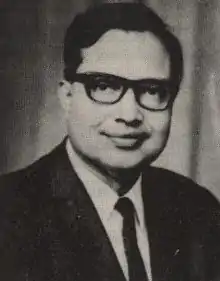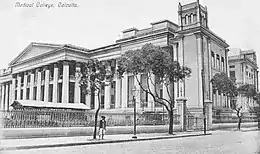Nirmal Kumar Dutta
Nirmal Kumar Dutta (1913–1982) was an Indian pharmacologist, medical academic and the director of Haffkine Institute, Mumbai. He was known for his contributions to the studies on cholera[1] and was an elected fellow of the National Academy of Medical Sciences,[2] National Academy of Sciences, India and the Indian National Science Academy.[3] The Council of Scientific and Industrial Research, the apex agency of the Government of India for scientific research, awarded him the Shanti Swarup Bhatnagar Prize for Science and Technology, one of the highest Indian science awards for his contributions to Medical Sciences in 1965.[4][note 1]
Nirmal Kumar Dutta | |
|---|---|
 Dr. Nirmal Kumar Dutta | |
| Born | 1 December 1913 West Bengal, India |
| Died | 2 May 1982 (aged 68) |
| Nationality | Indian |
| Alma mater | |
| Known for | Pharmacological studies on cholera |
| Awards |
|
| Scientific career | |
| Fields | |
| Institutions | |
Biography

N. K. Dutta, born on 1 December 1913 in the Indian state of West Bengal, did his graduate studies in medicine at Calcutta Medical College of the University of Calcutta and after earning an MBBS, moved to Oxford University for his higher studies from where he secured a DPhil in 1949.[3] Subsequently, he had a second stint at Oxford when he received the degree of DSc from the institution in 1964. A major part of his career was at Haffkine Institute, one of the oldest medical research institutes in India where he served as its director. He also served as the deputy director general of the Indian Council of Medical Research.
Dutta did extensive researches on cholera and pioneered the use of infant rabbits for developing a laboratory model for the studies which is reported to have promoted cholera studies in countries where the disease was not prevalent.[1] In 1959, he identified the toxin generated by Vibrio cholerae which causes diarrhoea during animal testing[5] and he used the classical biotype, Inaba serotype, V. cholerae strain 569B for the first time,[6] which is being followed today.[7] He also developed a methodology for the evaluation of vaccines and antiserum and was known to have proposed therapeutic protocols for treating cholera.[8] He documented his researches by way of several medical papers published in peer-reviewed journals[9][note 2] and his work has been cited by a number of authors and researchers.[10][11][12][13]
Dutta was associated with the World Health Organization, serving as a member of their Experts' Panel in Bacterial Diseases and Cholera.[3] He was a member of the Indian Pharmacopoeia Commission and the Drugs Technical Advisory Board of the Government of India and sat in the Expert Scientific Committee of Indian Council of Medical Research. He was also a member of the editorial boards of Archives internationales de Pharmacodynamie et de Thérapie and the Indian Journal of Pharmacology and served as the president of the Maharashtra chapter of the Indian Pharmaceutical Association. He died on 2 May 1982, at the age of 68.[1]
Awards and honors
Dutta received the Basantidevi Amirchand Award of the Indian Council of Medical Research in 1955 and the Watumull Foundation Award in Medicine in 1965;[3] the same year as the Council of Scientific and Industrial Research awarded him Shanti Swarup Bhatnagar Prize, one of the highest Indian science awards.[14] In between, the Indian National Science Academy elected him as a fellow in 1963; INSA would honor him again with the Shree Dhanwantari Prize in 1981.[15] He was also a fellow of the National Academy of Sciences, India and the National Academy of Medical Sciences.[2]
Selected bibliography
- Dutta N. K., Habbu M. K. (1955). "Experimental cholera in infant rabbits: a method for chemotherapeutic investigation". Br J Pharmacol Chemother. 10 (2): 153–9. doi:10.1111/j.1476-5381.1955.tb00074.x. PMC 1509487. PMID 14389652.
- Dutta N. K., Panse N. V., Kulkarni D. R. (1959). "Role of cholera a toxin in experimental cholera". J. Bacteriol. 78 (4): 594–5. doi:10.1128/JB.78.4.594-595.1959. PMC 290591. PMID 13818912.CS1 maint: multiple names: authors list (link)
- Dutta N. K., Panse N. V. (1963). "An experimental study on the usefulness of bacteriophage in the prophylaxis and treatment of cholera". Bull World Health Organ. 28 (3): 357–60. PMC 2554721. PMID 20604146.
- Dutta N. K., Panse N. V., Jhala H. I. (1963). "Choleragenic Property of Certain Strains of El Tor, Non-agglutinable, and Water Vibrios Confirmed Experimentally". Br Med J. 1 (5339): 1200–3. doi:10.1136/bmj.1.5339.1200. PMC 2123573. PMID 20789782.CS1 maint: multiple names: authors list (link)
- Williams E. M., Dohadwalla A. N., Dutta N. K. (1969). "Diarrhea and accumulation of intestinal fluid in infant rabbits infected with Vibrio cholerae in an isolated jejunal segment". J Infect Dis. 120 (6): 645–51. doi:10.1093/infdis/120.6.645. PMID 5374968.CS1 maint: multiple names: authors list (link)
See also
- Robert Koch
- Timeline of cholera
Notes
- Long link - please select award year to see details
- Please see Selected bibliography section
References
- "Brief Profile of the Awardee". Shanti Swarup Bhatnagar Prize. 2017.
- "NAMS Deceased Fellows" (PDF). National Academy of Medical Sciences. 2017.
- "Deceased fellow - NK Dutta". Indian National Science Academy. 16 November 2017. Retrieved 16 November 2017.
- "View Bhatnagar Awardees". Shanti Swarup Bhatnagar Prize. 2016. Retrieved 12 November 2016.
- Dhiman Barua (30 September 1992). Cholera. Springer Science & Business Media. pp. 158–. ISBN 978-0-306-44077-9.
- Hardegree, M. Carolyn; Tu, Anthony T. (5 August 1988). Handbook of Natural Toxins: Bacterial Toxins. CRC Press. ISBN 978-0-8247-7840-8.
- D. P. Burma; Maharani Chakravorty (2011). From Physiology and Chemistry to Biochemistry. Pearson Education India. pp. 252–. ISBN 978-81-317-3220-5.
- N. K. Dutta, N. B. Oza (1965). "A new approach to the treatment of cholera based on experimental evidence". Br J Exp Pathol. 46 (4): 418–421. PMC 2094611. PMID 5825777.
- DUTTA NK; PANSE MV; KULKARNI DR (2017). "Author profile". Journal of Bacteriology. 78: 594–5. doi:10.1128/JB.78.4.594-595.1959. PMC 290591. PMID 13818912.
- Noboru Motohashi (2 July 2008). Bioactive Heterocycles VI: Flavonoids and Anthocyanins in Plants, and Latest Bioactive Heterocycles I. Springer. pp. 79–. ISBN 978-3-540-79218-5.
- JUCKER (13 March 2013). Progress in Drug Research / Fortschritte der Arzneimittelforschung / Progrès des recherches pharmaceutiques: Tropical Diseases II / Tropische Krankheiten II / Maladies tropicales II. Birkhäuser. pp. 641–. ISBN 978-3-0348-7090-0.
- Benyajati, C (2017). "Experimental cholera in humans". British Medical Journal. 1 (5480): 140–142. doi:10.1136/bmj.1.5480.140. PMC 1843319. PMID 5901572.
- "Cholera Toxins: Immunogenicity of the Rabbit Ileal Loop Toxin and Related Antigens" (PDF). American Society for Microbiology. 2017.
- "Medical Sciences". Council of Scientific and Industrial Research. 2017. Archived from the original on 24 February 2013.
- "Shree Dhanwantari Prize". Indian National Science Academy. 2017.
External links
- N. K. Dutta, N. B. Oza (1965). "A new approach to the treatment of cholera based on experimental evidence". Br J Exp Pathol. 46 (4): 418–421. PMC 2094611. PMID 5825777.